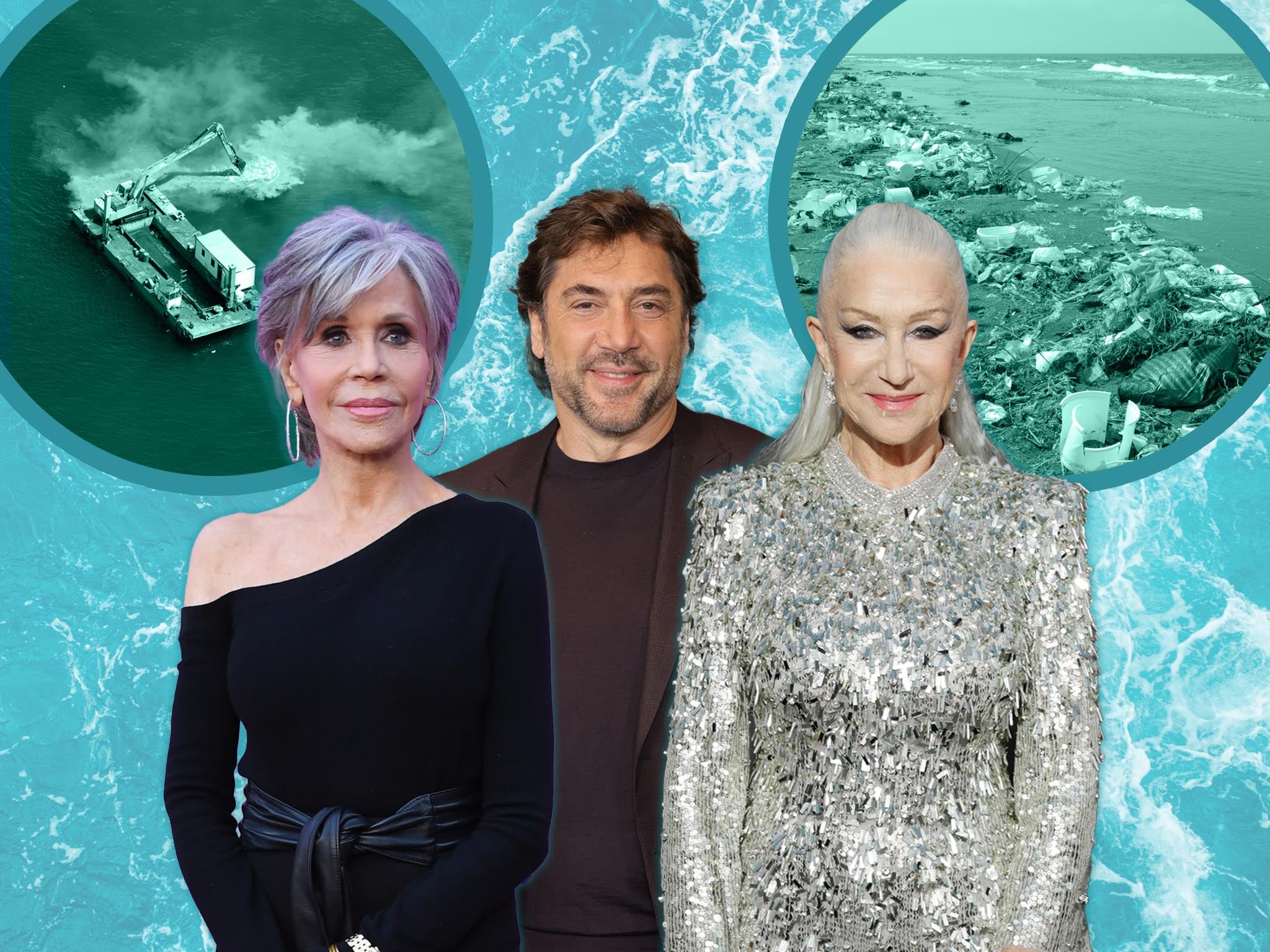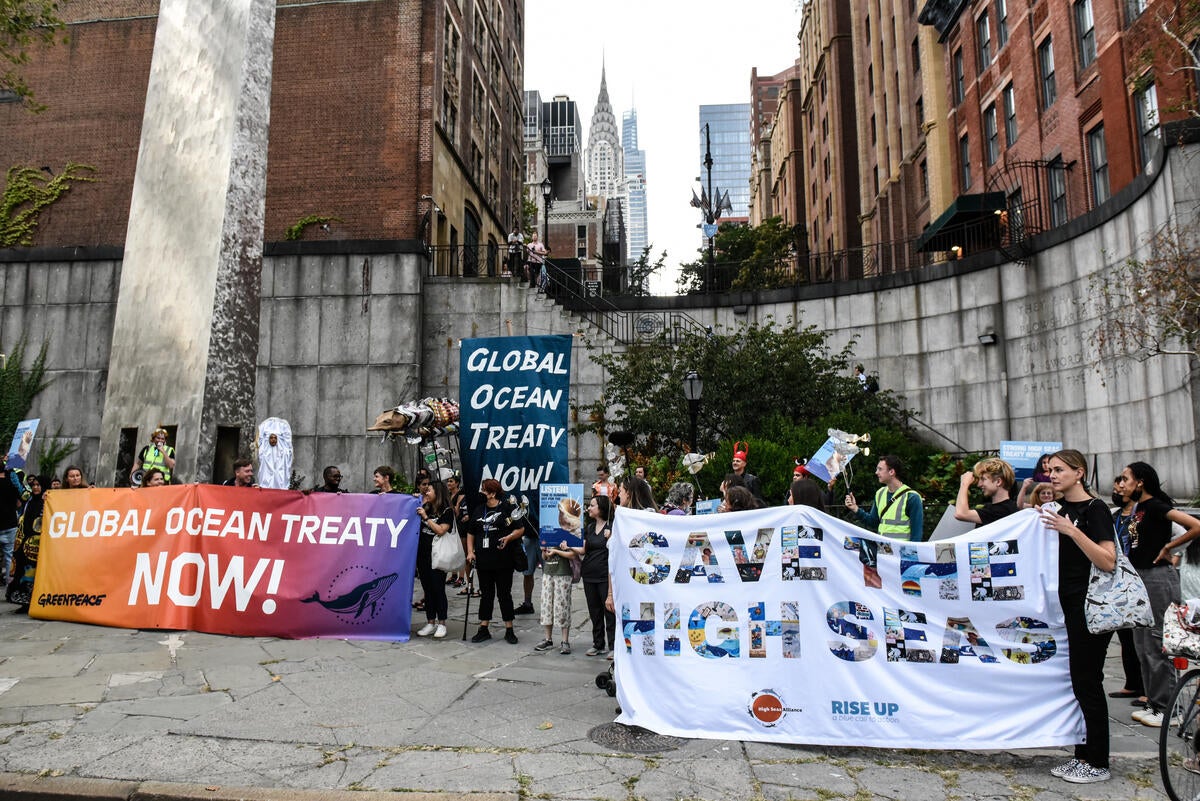Jane Fonda, Alec Baldwin and Shailene Woodley lead calls for UN ‘high seas treaty’ to stop ocean exploitation
Exclusive: Dozens of public figures and conservation groups have called for leaders to finally establish a High Seas Treaty, which has been negotiated for nearly two decades

Your support helps us to tell the story
From reproductive rights to climate change to Big Tech, The Independent is on the ground when the story is developing. Whether it's investigating the financials of Elon Musk's pro-Trump PAC or producing our latest documentary, 'The A Word', which shines a light on the American women fighting for reproductive rights, we know how important it is to parse out the facts from the messaging.
At such a critical moment in US history, we need reporters on the ground. Your donation allows us to keep sending journalists to speak to both sides of the story.
The Independent is trusted by Americans across the entire political spectrum. And unlike many other quality news outlets, we choose not to lock Americans out of our reporting and analysis with paywalls. We believe quality journalism should be available to everyone, paid for by those who can afford it.
Your support makes all the difference.A bevy of A-list figures including Jane Fonda, Adam McKay, Shailene Woodley, Helen Mirren, Michael Palin and Ted Turner have demanded that governments make good on a long overdue pact to protect the world’s oceans.
In a letter shared exclusively with The Independent, dozens of celebrities and conservation groups have called for a High Seas Treaty, which has been the subject of international talks for the best part of two decades.
“We need our oceans. They keep our planet habitable. They provide sustenance and livelihoods for billions, and are home to so much of our planet’s biodiversity,” the letter reads.
It continues: “Currently, there is no way for governments to protect the high seas, waters outside national jurisdictions. A strong Treaty would fix this by enabling the creation of vast ocean sanctuaries, off limits to destructive human activities.
“The need for action is urgent. Governments first discussed a new Treaty almost two decades ago. While they’ve talked, the ocean crisis has deepened. Countless species and habitats have been destroyed or lost.”
Other signatories include the actors Rosanna Arquette, Javier Bardem, Joanna Lumley, Stephen Fry and Mark Rylance; singers Alejandro Sanz and Grag Queen; comedian Sindhu Vee, and TV presenters Hugh Fearnley-Whittingstall, Fearne Cotton, and Chris Packham.
The leaders of environmental organisations including Greenpeace, Oceana, SharkProject International and Women4Oceans also added their support.
There are currently no legal protections for the “high seas” – the two-thirds of international waters that aren’t bound to any one country, and open to shipping, fishing, and research for all.
But the ocean, which covers 70 per cent of the planet and creates about 50 per cent of its oxygen, is under a multi-pronged attack from the climate crisis, environmental pollution and human exploitation.
The ocean has absorbed about 90 per cent of excess heat caused by greenhouse gas emissions, largely from burning of fossil fuels. The higher temperatures are impacting virtually all marine life.

If emissions continue unabated, more than 22,00 species face high or critical risk to their survival, according to research published on Monday. The greatest risk is to exploited species in low-income countries which rely heavily on fishing, the study found.
On top of this, between 75 and 199 million tonnes of plastic have entered the ocean with the equivalent of a garbage truck being dumped in every minute. This plastic breaks down into tiny particles, and travels up the food chain where it ends up on our plates and in the air we breathe.
Of increasing concern is deep-sea mining, where commercial companies scrape the ocean floor for minerals needed for new technology. Environmentalists warn that the technique can devastate marine ecosystems and release the “blue carbon” that has been stored in the sea bed for millennia.
A robust treaty could establish “Marine Protected Areas” to allow biodiversity to flourish, and require environmental assessments before heavy industry like mining takes place. It would aslo cement a promise made by dozens of countries to protect 30 per cent of oceans by 2030.
On Monday, countries’ delegates returned to the United Nations building in New York for a second week of negotiations but progress on the treaty has been slow.
Activists from countries including Nigeria, Mexico, Mauritius and Thailand protested outside the UN in midtown Manhattan on Thursday, and condemned the “lack of political will” inside.
Among the issues has been a lack of involvement by senior government officials, stalling momentum. And amid geopolitical tensions following its invasion of Ukraine, Russia has been obstructive to the process, according to reports. Both Russia and Iceland want fisheries, integral to their national economies, excluded from a final treaty. However overfishing is one of the biggest threats to ecosystems around the world.
If agreement isn’t reached by Friday, then the year will close with no treaty established.
“Over 5 million people have joined us to call for action to protect the oceans and deliver a strong Treaty,” the open letter concludes.
“Now it’s up to delegates to protect the oceans. Time truly is running out. The world is watching. The future is watching.”
Read the letter in full below
The future of the oceans is being decided this week at the United Nations, where governments are negotiating a new Global Ocean Treaty. The outcome will determine the fate of our blue planet for centuries to come.
We need our oceans. They keep our planet habitable. They provide sustenance and livelihoods for billions, and are home to so much of our planet’s biodiversity.
But they are in crisis. From industrial fishing to deep sea mining, the oceans face so many threats. Thankfully, more than 100 governments have joined scientists in supporting the solution; protecting at least 30% of the oceans by 2030, the 30x30 target, to give them space to recover.
This is impossible without a strong new Treaty.
Currently, there is no way for governments to protect the high seas, waters outside national jurisdictions. A strong Treaty would fix this by enabling the creation of vast ocean sanctuaries, off limits to destructive human activities.
The need for action is urgent. Governments first discussed a new Treaty almost two decades ago. While they’ve talked, the ocean crisis has deepened. Countless species and habitats have been destroyed or lost.
A strong Treaty would provide hope for the future of the oceans, and for the billions of people who depend on them.
A weak Treaty, or any further delay, would make 30x30 practically impossible. This would be a slap in the face for all those who have put faith in political leaders actually keeping their promises.
Over 5 million people have joined us to call for action to protect the oceans and deliver a strong Treaty.
Now it’s up to delegates to protect the oceans. Time truly is running out. The world is watching. The future is watching.
Signed by:
Will McCallum, Head of Oceans, Greenpeace UK
Bonnie Wright, Filmmaker and Author
Stephen Fry
Alec Baldwin, actor and activist
Javier Bardem, actor and activist
Carlos Bardem, actor and activist
Rosanna Arquette, Actor and Activist
Shailene Woodley, Actor and Oceans Advocate
Shepard Fairey, Artist and Activist
Susan Sarandon, Actor and Activist
Alejandro Sanz, singer
Jane Fonda, Actor and Activist
Ted Turner, Founding Member, Ocean Elders
Joanna Lumley
Gustaf Skarsgård, actor and activist
Alison Sudol, singer, actress and activist
Piper Perabo, Actor
Amber Valletta, Model and Activist
Adam McKay, Writer, Director, Producer
Hugh Fearnley-Whittingstall
Sindhu Vee
Chris Packham
David de Rothschild
Arizona Muse
Hayley Atwell
Helen Mirren
Lily Cole
Mark Rylance
Robert Lindsay
Sindhu Vee
Michael Palin
Fearne Cotton
Lillian Ono, Climate justice activist
Masahiro Takemoto, Diver and Environmentalist
NOMA, Model and Activist
Daisuke Yosumi, Author and Naturalist
Álvaro Longoria, film director and activist
Grag Queen, singer and activist
Farah Obaidullah, Women4Oceans
Inde Relph and Sally Ranney, Co-founders, GlobalChoices
Cornelia Nauen, Mundus Maris - Sciences and Arts for Sustainability
Brett Sommermeyer, Law of the Wild, Legal Director
Vicki Nichols Goldstein, Inland Ocean Coalition
Silvia Frey, KYMA sea conservation & research
Andrew Sharpless, Oceana, CEO
Alex Smolinsky, SharkProject International, President
Join our commenting forum
Join thought-provoking conversations, follow other Independent readers and see their replies
Comments